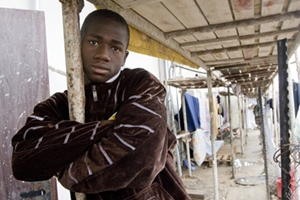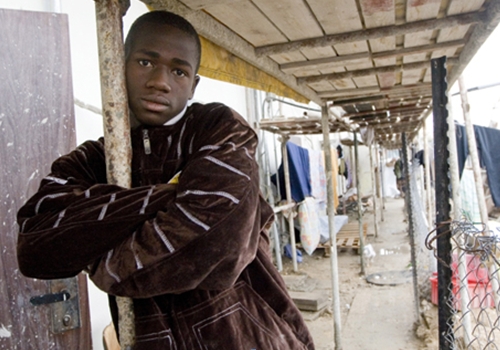
The second and third readings of a bill to deter migrant workers from entering Israel continued late into Monday night in the Knesset plenum. The bill would make migrants and asylum seekers liable to jail, without trial or deportation, if caught staying in Israel for long periods. In addition, anyone helping migrants or providing them with shelter could face prison sentences of between five and 15 years. Lawmakers who objected to the bill said it was undemocratic, unconstitutional and ran contrary to Israel’s international obligations and human rights.
The bill would amend the Prevention of Infiltration Law of 1954, passed to prevent the entry of Arab-Palestinian refugees as part of emergency legislation. The new bill is expanded to address migrant workers or asylum seekers who enter Israel without posing a threat to Israel’s security.

An African refugee in South Tel-Aviv (Photo: Activestills)
According to the bill, migrant workers already here could be jailed for the most minor offense such as spraying graffiti or stealing a bicycle – infractions for which they would not have been detained before. They could be held for anywhere from three years to life. “This is extremely irregular, because in Israel today it is legally impossible to keep a person in custody for years without putting him on trial and proving his guilt in a legal procedure,” Knesset legal advisor Eyal Yinon told the Constitution Committee last month.
“So that the law adheres to minimal constitutional standards, the release of a migrant after three years must not be left to the discretion of the official in charge. It must be made clear that after three years the person will be released,” Yinon said.
MK Dov Khenin (Hadash), one of the staunchest objectors to the bill, said “This bill is dangerous, immoral, unconstitutional and contrary to the law of human dignity and freedom. It runs contrary to Israel’s international commitments and the Knesset should reject it out of hand.”
The people who give aid and shelter to the migrants will have to prove they did not know the person or people they were helping were illegal migrants under the bill, unlike the customary situation in which the state must prove that the assistance provider was aware of the migrant’s identity.


